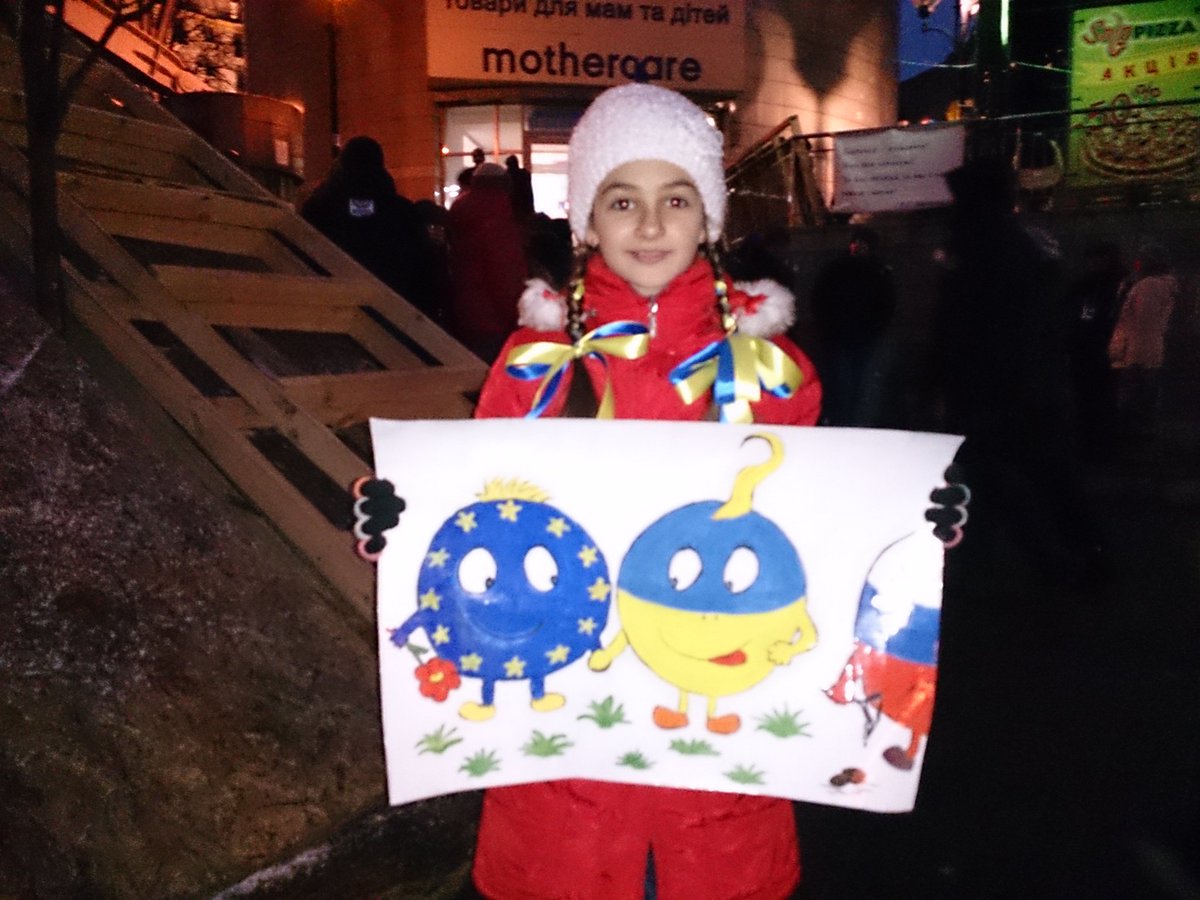A personal thread about the Revolution of Dignity in Ukraine, known as Euromaidan, which began in Kyiv on this day eight years ago.
Just 5 months earlier, I decided to return to Ukraine after my Master studies in Italy. Little did I know about what was going to happen
(📷 mine)
Just 5 months earlier, I decided to return to Ukraine after my Master studies in Italy. Little did I know about what was going to happen
(📷 mine)

Pro-Russian president Yanukovych was ruling Ukraine at the time. Still, I decided to come back willing to invest my knowledge and skills into Ukraine's better future.
The prospect of Ukraine signing the Association agreement with the EU, promised by the government, gave me hope
The prospect of Ukraine signing the Association agreement with the EU, promised by the government, gave me hope
On November 21, 2013, Yanukovych announced he was not going to sign the agreement with the EU. Pressure by Russia was the main reason.
This felt like a thunderstorm. Civil society activists decided to stage a spontaneous protest, and journalist @mefimus called everyone to Maidan
This felt like a thunderstorm. Civil society activists decided to stage a spontaneous protest, and journalist @mefimus called everyone to Maidan
I was there since the very first day, with a bunch of friends. I came after 10 PM, when my working shift on TV ended. It was a rainy evening, but the atmosphere was very warm. There were several dozens of people, activists and journalists. No politicians yet: it wasn't about them 

At the Vilnius summit on November 29-30, Yanukovych officially refused to sign the Association agreement with the EU.
Protesters still gathered at Maidan every evening, and a small group stayed overnight.
On Nov 30, students were brutally beaten at night by Berkut special units
Protesters still gathered at Maidan every evening, and a small group stayed overnight.
On Nov 30, students were brutally beaten at night by Berkut special units
This was a turning point. A massive crowd - several hundred thousands people - gathered in Kyiv on December 1.
Now, the protest wasn't only in favour of Ukraine's integration with the EU. It was against the police brutality and Yanukovych government corruption



Now, the protest wasn't only in favour of Ukraine's integration with the EU. It was against the police brutality and Yanukovych government corruption




Authorities hoped that the crowd will disperse somehow and the protest would fade away, but it only grew stronger by the day.
The tent camp at Maidan was growing. There was an incredible mobilization of society, people arrived from all regions, Kyivans brought food, warm clothes

The tent camp at Maidan was growing. There was an incredible mobilization of society, people arrived from all regions, Kyivans brought food, warm clothes


As rumours spread the police would try to storm the Maidan at night of December 8, me and my friends rushed there in the middle of the night. We didn't even have to take a taxi: people online offered each other free rides. The solidarity was very strong, in subzero temperatures 







Since the beginning of Maidan, I started tweeting about it in English to draw the world's attention to what was happening (I bought my first smartphone when protests began). I also commented for international media, especially Italian. It was a privilege to be Ukraine's voice
There were only several people on Twitter who told the world what was happening in Ukraine in English. I'd like to mention @myroslavapetsa, @MaximEristavi, @Kateryna_Kruk. Their contribution was very important to spread the word globally, and I am proud to know many of them
The rest is known: Yanukovych launched a brutal crackdown at Maidan in February 2014.
After the first deaths in January, I left a TV station I worked at the time in protest against its increasingly pro-Russian coverage. Russian nationals were in the newsroom giving orders



After the first deaths in January, I left a TV station I worked at the time in protest against its increasingly pro-Russian coverage. Russian nationals were in the newsroom giving orders




In January-February, I covered Maidan for foreign media and continued to write about it on Twitter. I was there almost every day. On February 20, the bloodiest day, when more than 100 people were killed, I made these photos at the hotel Ukraina, temporarily turned into a hospital 





It was a tragic ending of the Revolution of dignity. But it wasn't a defeat. Yanukovych escaped to Russia, and while Ukraine mourned its Heavenly hundred, Russian aggression began in Crimea. People went out to Maidan again - this time, calling Putin to stop 

I witnessed the Orange revolution of 2004 and the Revolution of dignity in 2013-14. Both times, I was amazed by the ability of Ukrainians to mobilize, to protest peacefully and to achieve their goals. Those were very empowering events, giving me confidence that people have power
It was striking to see amazing scenes of solidarity, people of all social strata coming together: making sandwiches while others build barricades; priests talking to protesters covered in smoke; businessmen donating money to support protesters; doctors volunteering to save lives 







As in 2013, I don't know what is going to happen next in Ukraine. Russia is threatening with a renewed aggression, putting in doubt Ukraine's very existence. But I know for sure, Ukraine and Ukrainians do exist, and they will fight for their freedom. I stand with them.
END
END
• • •
Missing some Tweet in this thread? You can try to
force a refresh





